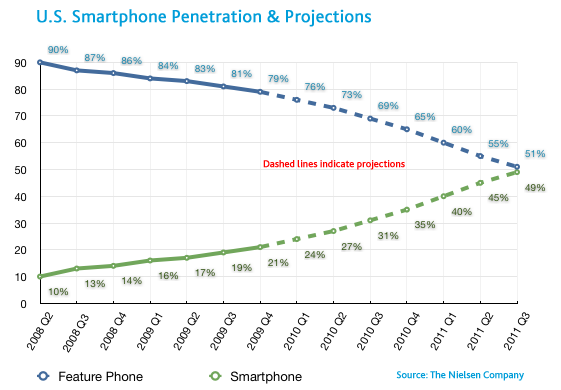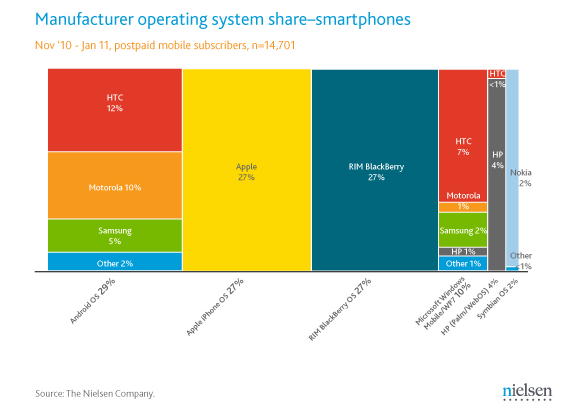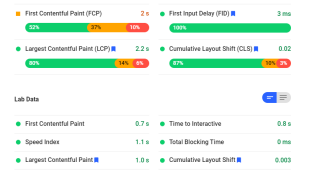The Difference Between Apps and Mobile Websites
There is no question that mobile is the fastest growing online space. As millions worldwide migrate to smartphones, the number of people who are downloading apps and browsing the web on their phone is growing at an incredibly rapid pace.
Seeing this impressive growth leads to an obvious question: what is the best way to reach customers who are increasingly using mobile devices?
At first, the answer seemed obvious. The explosive growth of the iPhone and the App Store made it seem like we had a future that would be dominated by single use applications.
In 2011, this future is no longer as certain. When building an App you must target a specific platform. In a landscape entirely dominated by the iPhone, this is easy to do. However, the rise of Android has meant that the smartphone market is increasingly fragmented when it comes to choosing which platform to target.
So now there are more platforms to target and the explosive growth of tablets to consider. For a company with a limited budget, it is hard to target every platform. But there is a solution. In our opinion, the best way to approach mobile in 2011 is through a mobile website.
To explain our position, it makes sense to clarify what the difference is between an App and a Mobile Website.
What is an "App"
An "app" is a software application that is written in the native language of a particular platform. This has some tremendous advantages:
- By using native code, the application can run with high performance.
- It is easy to follow the User Experience conventions using provided libraries
- The app is available in an App Store
- It can work offline
- The App can be launched in a single step
- Your native code only works on one platform
- You must learn development skills that just apply to one platform
- Your app can't be found directly on the web, it requires more "investment" for a customer to download it.
What is a Mobile Website
A mobile website is just a website that has been optimized for mobile browsing. It can be reached through a phone's web browser directly. There are some great advantages to doing a mobile site:
- One mobile site can work on any mobile platform
- It is generally faster and cheaper to develop a mobile site
- A mobile site can just be a 'version' of your primary website.
- It is becoming possible to embed an Mobile site in an App using technology like Phonegap
- Customers can google you and land on your mobile site
- Since it's a website, it can be easily updated through a CMS
There are some disadvantages too:
- They aren't written in native code, so performance can be an issue
- You cannot access all of the phones features (camera, etc) that are available to apps
- It requires some number of steps for a customer to bookmark your mobile site
- It is hard to charge for access or usage
Our Recommendation: Mobile Websites over Apps
There are a number of reasons that we generally recommend putting your resources towards mobile websites before Apps.
Discover-ability
When people are looking for information, they go to Google, not the app store. A mobile website is a better way to reach more customers.
Cost
It is generally much less expensive to build a mobile website so the bang-for-the-buck is much higher. You also get to develop one version and it works on all smartphones.
Increasing Performance
As mobile browsers become faster, the performance gap between apps and websites is closing.
Future Safety
An individual platform may disappear, but the web will not. You can be sure that a mobile site that looks good on a 4" screen today will also look good in 5 years.
App Optional
Tools like PhoneGap are making it easier to wrap mobile websites into apps.
There is certainly still a place for Apps, but for most companies trying to market themselves, it is a much better first step to go with a mobile website.
/p>





Comments
polska telewizja w uk 2016
Well, if you intend to put something on your screen,ie watch some LIVE channels, be prepared to fork out $30 - $ 70 dollars every
single month for your satellite TV subscription. The main reason was that he had to hire
computer programmers that could transfer the professor's complex formula into an easy to understand system that anyone could use.
This was proven when the Green Lantern film came out last year and failed to enjoy
the same kind of success that Iron Man did.
Scott
Great article and answered my question!!Scott Browning
Hey great article. The recommendation is nice, as most information-giving sites don't provide a recommendation and leave the decision up to the reader's interpretation. Wanted to let you know that I linked to this article from my latest blog post http://www.sydcon.com/blog/seven-functional-differences-between-a-mobile-app-and-a-mobile-website/Keep up the great work!
Mickey Mixon
Thank you for sharing with this since I don't know really the difference between the two.Kiran
Thanks for sharing useful information for those looking for Mobile .....shunryui nik
thanks for this great info... i was going to learn coding for app cause i have a brilliant idea to work upon!!!........like facebook i dont have any coding knowledge to make such a huge website..
Saravanan
A very useful article! Thank you very much..I found useful website that has mobile websites collection... http://www.mobilewebsitesubmit.com and mobile version of the website is http://m.mobilewebsitesubmit.com
Thanks guys
Ted Mellin
Yes, Phonegap does require that you install and get a basic understanding over each platforms SDK , but in my opinion the biggest drawback with Phonegap is that it introduces many of the same drawbacks that the native apps have, one of the major one being that the users have to install it. Furthermore, HTML5 does in fact introduce alot of the same functionality that Phonegap has to offer, like geolocation, storage and most likely even camera in the near future :)Joel Sutherland NMC team member
Thanks @Vasant and @GaryThat's a great point @Ted. I'm glad that is becoming a good alternative to using a complicated wrapper like Phonegap.
Ted Mellin
Great article, however, you write that An app can work offline, but so can a mobile website, by using the HTML5 offline manifest, this is something that will boost mobile web site development for sure =)Gary Galloway
Great analysis. As a former Nielsen employee it is great to see them expanding beyond Television measurement. I also think this is a great and natural progression for a company's strategy. Website > Mobile Website (if necessary) > App (if necessary).Vasant Nayak
Hello!Good information and analysis! Those of us trying to decide on whether to get an app built or a mobile website can now make the decision with this guidance. While having an 'App' sounds cool - the mobile website seems more practical and beneficial.
Thanks!
Vasant
Leave a comment